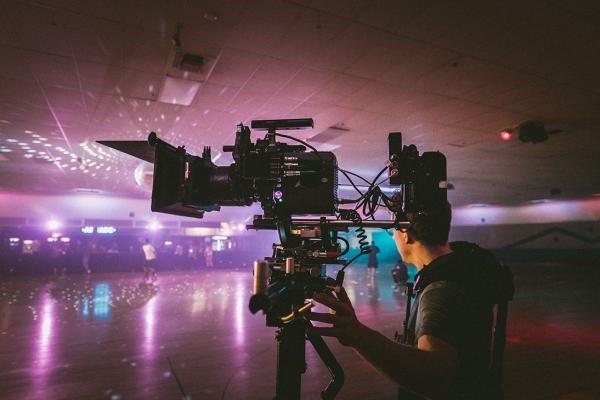5 Things to Fix Right Now to Help Your Filmmaking Career
By Jen Alvares | 26-Jul-2022

The world is full of opportunities, but you have to be prepared to grab them. Unfortunately, I constantly see young filmmakers skipping over the fundamentals, so they end up struggling to make meaningful progress. Here are a few easy things that will help to free your career path from unnecessary obstacles.
#1 - Create a Website
'Do I need a website' should never be an actual question for anybody trying to advance their career. As a filmmaker, you need to understand that you are in the business of selling your talent... every single day, and nobody can sell it better than yourself. You might already have some press coverage; however, there should always be one centralized source that controls the narrative, and that source is your website.
It goes without saying that you should update it once in a while, or to be exact, once any meaningful event occurs in your filmmaking career. Completed one more project? Update your website. Joined a union or became a member of a professional organization? Update your website. Received an award, or your project was screened at a film festival? Update your website. You get the idea.
If you don't know what to write about yourself or think you haven't done anything significant to mention on your website, think again. Chances are, there are too many things that you are taking for granted. There are plenty of achievements that you can and should mention, such as film school education; projects you are currently working on; any filmmaking volunteering experience, etc. Make sure to upload your short films, trailers, or any videos that provide more information about you as a filmmaker. If you have any press articles about yourself or your projects, showcasing these links on your website can add additional credibility to your professional image. Anything that makes you look more credible works.
#2 - Make Your Contact Information Easily Accessible
This might sound silly, but the vast majority of young filmmakers make it really hard to get in touch with them. While most filmmakers have a website and an Instagram page, they fail to put their email and basic contact information to good use. When it comes to professional communication, email is still what everybody is looking for. I cannot stress enough how many times my team couldn’t find an email address of an artist or filmmaker we wanted to work with. Another good example is that my film festival (and many other film festivals) like to invite filmmakers to submit their films. Such invitations can include a discount code, a deadline waiver, or just additional resources that can help you navigate the world of film festivals that you may not be aware of yet.
That being said, make it easy for other professionals to reach out to you. Don't be afraid to leave your email address on your website’s contact page. Make sure there are no extra steps that have to be taken to get in touch with you — usually, you are dealing with people that are short on time, and they will appreciate the accessibility and efficient communication style. Keep in mind that contact forms can be annoying and have some limitations that are not always convenient to deal with. As a bonus, add your email contact info to your Instagram / Twitter / TikTok / etc. profile. If you are afraid that your email address will be “stolen” and added to some spammy-like database, I have “news” for you: they will do it regardless by using specialized software that collects such information.
If you want to look even more professional than most of your filmmaking pals, get yourself a business email that has your domain name in it, aka john (at) johndoe.com. It costs around $10 per month, and you can easily set it up with the help of many YouTube videos.
#3 - Lose Your Ego
Ego is probably the most common reason people would avoid working with you. Why? Where do I start... Well, people like to work with people they like, and ego may hinder your ability to get on the list of likable individuals. Even more importantly, ego is also counterproductive to teamwork, which is essential for almost all industries, especially filmmaking. As a result, it can seriously harm a project and, therefore, your career.
It's important to understand that when you’re involved in a project, it's everybody’s job to work together for the sake of a project’s success. In no circumstances can you allow yourself to become another problem that everybody has to deal with. For example, I’ve worked with a number of directors and DPs who just didn’t know when to stop either changing things or adding things in an attempt to achieve a level of perfection that does not exist. Yes, we all get it that there is a James Cameron reference in your head, but we are all working within a certain budget and a restrictive deadline, so you’re either a part of a solution here or a part of a problem. If you choose to be the latter, then the project will suffer in at least one of these three ways: time, budget, or quality. For example, you can experience significant budgetary issues that will hurt the bottom, it may result in the inability to complete what was planned due to lack of time, or the overall quality of the project will suffer.
Another example of ego would include a failure to admit that there are things you don't know and, therefore, you would need to seek guidance from a teammate who is well versed in the subject matter in question. For instance, a director that doesn’t have much experience in VFX but wants everybody to think the opposite, so he simply ignores recommendations from a VFX studio. As a result, the director learns the hard way that these mistakes cannot be fixed in post-production. It’s essential to be comfortable asking for advice or help — after all, there is a reason we have dozens of different specialists that come together to work on a project.
#4 - Find a Mentor
Having somebody you respect and professionally admire in your corner can be highly advantageous to your career. Young filmmakers, just like any other young professionals, need guidance. You see, from the moment you’re being born, you have your parents who give you structure and directions. Then you get it at kindergarten, then at school, and later in college. Once you graduate from college, there is no more roadmap that will help you navigate the world and ensure that you’re staying on a track towards success. That's why many college graduates feel lost and go through many years of deep mental struggles before they can create the version of themselves they like and understand. That’s why having a mentor is so important.
Now, how do you get one? It's not as difficult as it might appear to you. Think about people from your industry that inspire you, that you can learn from, and that motivate you to be better. Don't aim for a celebrity but rather pick somebody credible in their niche or, in other words, industry segment. For example, a professor, a more seasoned professional, a staff member at a film festival, an industry business owner, etc. — anyone can be a mentor if they are knowledgeable about the area that you need the most help in.
Thanks to social media, you don’t have to know them personally, so not knowing a lot of people from the industry or living in a small city cannot be your excuse here. Send this person an email asking to mentor you. In your email, write a few things about your character and aspirations, explain why you chose them and not somebody else and propose a reasonable schedule that both of you can commit to. For example, a 1-hour long Zoom call once a month should be a pretty reasonable arrangement for both parties. If they can’t do it, respect that they are busy, and continue your search. Eventually, the right person will respond to your proposal and will be happy to help you.
#5 - Say Yes to Opportunities
Be enthusiastically open to opportunities that come your way. What does it mean? Don’t rush to say ‘no’ but instead think about how you can make it work and how it can help your career down the line. Building a successful career is a long-term endeavor. In many cases, it will depend not just on your talent and hard work but also on the positive connections that you make with other industry professionals and on the realization that your own success is rooted in your ability to help others first.
When opportunities knock on your door, don't wait too long to decide because when you take too much time, the decision will be made for you — typically, this will not be to your benefit. For example, I had a contractor once who took about two months to sign an agreement, and by the time they finally decided to turn the signed contract in, I was already completing the project with another artist. Nobody will wait around for your decision — things move fast, and what was suggested to you yesterday might be taken away today by somebody else who chose to move faster.
Finally, you have to be prepared that some opportunities will work out and others won't, and that's ok. You can’t win everywhere. The more opportunities you get, the more rejections you will receive. It's simply a numbers game. Don’t get upset; keep it professional because that person may consider you again shortly in the future.
Comments

